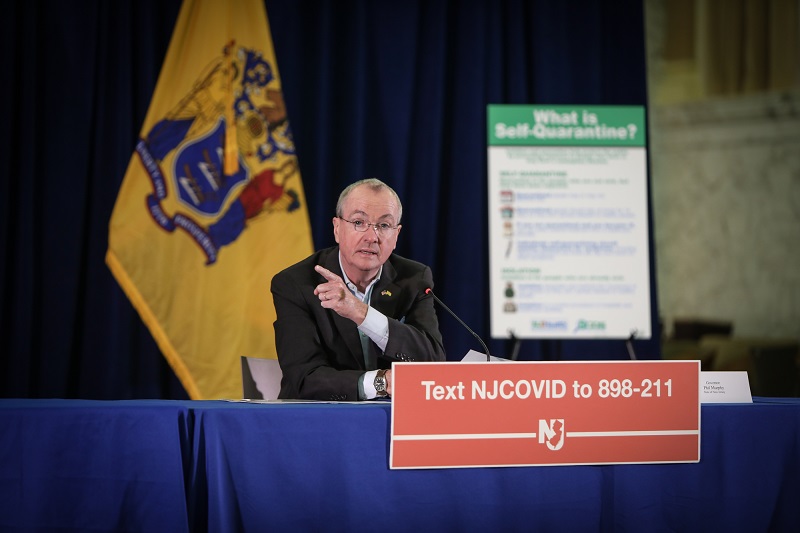David Brogan is the executive director of the New Jersey Apartment Association — Photo by Mary Iuvone for Real Estate NJ
By David Brogan
Like everyone else, we expected 2021 to be better and easier. At the beginning of the year, the vaccines were starting to roll out, the feeling was positive and the worst was behind us. But then the reality of 2021 set in. Across the country, with the rise of the Delta variant, supply chain problems, labor shortages and unanticipated weather events, we were thrust into another difficult year. It wasn’t the 2021 we had all hoped for — it was “2020 redux” — and it was just as challenging but in different ways.
I think many elected officials view the apartment industry as being one-dimensional. That is, they simply view it as a landlord renting housing to a tenant. In reality, the construction, maintenance and operation of hundreds of thousands of apartments is complicated. Furthermore, we support over 50,000 people in full-time jobs, with benefits. Collectively, all of this helps revitalize municipalities and boost economic activity throughout the state. The owners of these properties utilize hundreds of New Jersey businesses both big and small, by purchasing products and services. So, when you walk into an apartment, understand that businesses provide everything you see, from windows, doors, flooring and light fixtures, to cabinets, countertops, sinks and appliances. I think elected officials forget that we are an important and multifaceted industry in this state. We not only provide and maintain housing, but in the process, we provide tens of thousands of good-paying jobs, boost our economy and pay billions of dollars in tax revenue.
So, as the pandemic raged on, while elected officials were focused solely on preventing evictions, we had to deal with that plus every other issue facing businesses during this time. That included keeping employees safe and being responsive to our customers, which are our tenants, along with maintaining the buildings and meeting our own financial obligations. Again, I think that sometimes elected officials forget these challenges and the multifaceted nature of our business.
In short, it was a very challenging year to say the least. Below are the answers to some key questions about what transpired in 2021 and where we go from here.
Clearly from a government affairs perspective, the eviction moratorium was the primary focus for the association. How do you think the Legislature handled that issue, and are you comfortable with the outcome?
I think everyone knew that such a policy could not remain in place forever, whether that was the federal eviction moratorium or the state eviction moratorium. As we pulled out of the grasp of the pandemic, government mandates to provide free housing would no longer be justifiable from either a policy perspective or a legal perspective. And figuring out how to end the eviction moratorium, while keeping the perspectives and concerns of both the landlords and the tenants in mind was no easy task. Having said that, my hat goes off to Sen. Brian Stack, who forged a compromise and shepherded S3691 through the legislative process from beginning to end.
What is so unique about S3691 is that it not only addressed the concerns of all parties, but it did so with a sense of pragmatism and realism. The bill phased out New Jersey’s eviction moratorium in a way that helped the most vulnerable people, low- and moderate-income families, for the longest period of time. It also provided $250 million in utility assistance and $500 million in rental assistance. What’s more, that $500 million was in addition to the $625 million we had already received in rental assistance from the federal government. So, funding at this level can help both tenants and landlords dig out of the hole that was created by COVID-19 and help them get back on their feet.
Lastly, if you look at the comments made about the bill after it got signed, you will see that both landlord advocates and tenant advocates lauded the bill. That doesn’t happen very often.
RELATED: Murphy signs bill to end eviction ban, providing new protections for renters

That is a unique outcome. It seems like getting a final agreement on a bill like that would be difficult, if not impossible. What was that process like?
The negotiations on that bill were extremely difficult. Both sides felt justified in their position. The tenant advocates felt that it was a life-or-death situation, and while we understood that, the practical reality was that we could not continue to provide that housing without rent revenue. We were caught between a rock and a hard place. And while the banks were giving mortgage forbearance, that was only temporary and, quite frankly, the mortgage is only a portion of landlords’ overall costs.
For example, there was no moratorium on property tax payments or income tax payments. Furthermore, if property tax payments weren’t made in full and on time, liens could be placed on our properties. On top of that we needed to maintain those properties, make repairs and meet all of our other financial obligations. You have to remember, rental assistance came late in this pandemic and, not only that, the pace in which that assistance was and is being distributed is slower than expected.
The unfortunate reality about those negotiations was that some tenant advocates came at this from the perspective that landlords should simply shoulder the financial burden of providing free housing in perpetuity, which, quite frankly, is not sustainable. Bills like “The People’s Bill,” which mandated 30-month repayment periods, were myopic and would have been devastating for landlords. Candidly, such policies would have put our entire rental housing market in a downward spiral.
I feel that NJAA approached the negotiations from the perspective of both landlords and tenants. Clearly, we wanted to protect the industry, but we had to keep the tenants’ perspective in mind as they are our customers, and without them, our industry doesn’t survive. But at the end of the day, we needed a date certain as to when the eviction moratorium would end, and we needed financial assistance.
As an aside, the key flaw in New Jersey’s eviction moratorium was that it wasn’t based on need or COVID impact. It was simply a blanket moratorium. I think most landlords understood that tenants who were truly impacted by the pandemic were struggling and needed help. They understood that aspect of the moratorium. But at the same time, there were many landlords who told me horror stories of tenants who simply refused to pay “because government told them so” or worse, people making hundreds of thousands of dollars easily exploited the moratorium. Simply put, there was no means test. I hope that in the future, if broad-based policies such as this are ever instituted, there will be a requirement to demonstrate need. That way, government can fulfil its mission of helping the most vulnerable without opening the door to fraud and exploitation.
Regardless of our position or the tenant advocates’ position, the only way we would ever get to a workable statute was if there was leadership. And Sen. Stack demonstrated that leadership. While neither side got everything they wanted, the final product was a workable and pragmatic solution.
With respect to rental assistance, how is the process working and is it getting out to the tenants and landlords who need it? Also, how is New Jersey’s program compared to other states?
Nationwide, only about 25 percent of the rental assistance provided to the states and localities by the federal government has been distributed. That is due to a number of factors. First, there are significant restrictions as to how that money can be disbursed. Second, governments needed to develop the necessary infrastructure to get that money out. You can’t simply receive hundreds of millions of dollars and expect to properly distribute that money without a sophisticated infrastructure. There needed to be checks and balances or the states and localities could be penalized.
One benefit New Jersey had was that due to the leadership of Senate President Steve Sweeney and Sen. Stack, who authored a bill that established a rental assistance program very early on in the pandemic, we ended up creating that infrastructure months before the federal rental assistance even started. While the bill was vetoed, Gov. Phil Murphy established a $100 million rental assistance program that mirrored what the Legislature had requested. This enabled the State of New Jersey to build the infrastructure that would eventually be used to administer rental assistance throughout the pandemic. While the governor and the Lt. Gov. Sheila Oliver deserve the ultimate credit for creating the program and the corresponding infrastructure, we should also recognize that this would not have happened but for the efforts of the Legislature.
When you look at how New Jersey distributed the first tranche of federal rental assistance, we were in the top five states in the country as it pertains to meeting expectations. Having said that, disbursement of those funds could be faster, and my number one criticism of the current program is the use of a lottery system. In New Jersey, you apply for rental assistance, you get preliminary approval, you get secondary approval, then you go into a lottery and wait. Once you are picked out of that lottery, you get final approval and only then is the money distributed. I see no reason for the lottery system, and I think the state should eliminate it. It is an unnecessary barrier that simply slows down the process. But even with that criticism, New Jersey is doing a better job at distributing the rental assistance money than most other states.
RELATED: Murphy announces $100 million rental assistance program

Is the amount of rental assistance enough to make your industry whole?
As I mentioned earlier, S3691 allocated $500 million in rental assistance from American Rescue Plan Act (ARPA) funds. This is in addition to the $625 million of federal funding that New Jersey was provided by the U.S. Treasury for the specific purpose of rental assistance. Furthermore, we had the early $100 million program, as well as municipal and county rental assistance programs. Collectively, this is a significant amount of funding, but it is limited.
First, we anticipate that by the time the eviction moratorium is fully lifted on Dec. 31, New Jersey’s residential landlords, both large and small, will have incurred between $2.5 and $3 billion in unpaid rent. Rental assistance will only be enough to cover approximately half of those losses. Second, rental assistance is being allocated both to pay rent arrears and to help tenants pay their ongoing rental obligations, so not every dollar is going toward satisfying what tenants owe. Third, one of the issues that we are experiencing now is tenants refusing to apply for assistance, planning just to move when the eviction moratorium expires. S3691 required tenants to apply for rental assistance in order to get ongoing protections, which was a good incentive toward utilizing the state and federal money that is meant to help them. However, even with that requirement, we hear from many landlords with tenants who simply will not apply. Finally, while the eviction moratorium protected all tenants, rental assistance is being prioritized to low-income tenants. While we support that prioritization, that leaves many middle-income tenants with little or no chance of getting rental assistance. As such, the only way landlords can even consider recouping those arrearages is by going to court and getting a money judgment, which isn’t easy.
Ultimately, both large and small landlords will collectively incur billions of dollars in losses that will never be compensated from rental assistance. It’s important to recognize the challenges that this creates for landlords and the entire multifamily ecosystem.
What do you expect over the next six months?
First, I am hopeful that Gov. Murphy and the Legislature recognize that we are an industry that was hurt during the pandemic, and we are recuperating. No other industry was treated the way we were. In many cases, we were forced to provide housing with no compensation from tenants for more than a year and a half, and it has taken its toll. So, I just hope that they understand that adding new mandates or new restrictions on an industry that is trying to recover is not good public policy.
More specifically, we have heard rumors about statewide rent control. That would be one of the worst policy moves in New Jersey’s history. New Jersey already allows municipalities to impose rent control if they wish, and who better to understand their towns but the mayors and councils themselves. Beyond that, rent control negatively impacts economic activity and property values. It minimizes or eliminates landlords’ ability to maintain their properties, and, most importantly to the Legislature, it leads to a massive property tax shift onto homeowners. Therefore, if such a policy were to be imposed, homeowners better be ready for a massive property tax increase.
We also have to ensure compliance with new statutes such as the Fair Chance in Housing Act, new laws concerning lead-based paint and a mandate to install covers on steam radiators upon the request of tenants. NJAA takes pride in providing information to both members and non-members regarding their responsibilities under these new laws. We say it all the time: “What you don’t know can, in fact, hurt you.” So we urge those in the industry to look at our website, see what classes we have to offer and participate in those classes. Providing education and professionalizing apartment staffs is just one way we make the distinction between our members and the rest of the landlords out there.
Lastly, your association was one of the most visible and active associations in New Jersey during this pandemic. What is next for the NJAA?
The pandemic and subsequent focus on housing brought our industry and our association front and center. As the only statewide association focusing solely on the multifamily industry, I felt that we needed to take a much more visible approach. Over the past 20 months we were mentioned in the press over 300 times. While that is positive, it was actually necessary to get our side of the story out to the public and to lawmakers. I think that led to more balanced policymaking. I also think it established our association as one of the most effective associations in the state, and I am proud of that.
As for what’s next, beyond our nonstop efforts to protect and promote the multifamily industry, NJAA will be moving from Monroe Township to State Street in Trenton, in March 2022. I feel that being on State Street will not only help us be more effective in lobbying simply due to its proximity to the statehouse, but it also lets everyone know that we have arrived. That is, we have taken an association that was somewhat in the background, and we have brought it to the forefront. Our issues are important enough to be front and center, and our association should do the same. At the end of the day, there are few things more important than housing, and I am proud to lead the organization tasked with protecting that housing.
David Brogan is the executive director of the New Jersey Apartment Association, a statewide organization whose membership owns and manages more than 225,000 apartment homes across the state and boasts over 400 vendor members that represent approximately 135 industries throughout the state and nationally. is the executive director of the New Jersey Apartment Association.
Murphy signs bill to end eviction ban, providing new protections for renters









